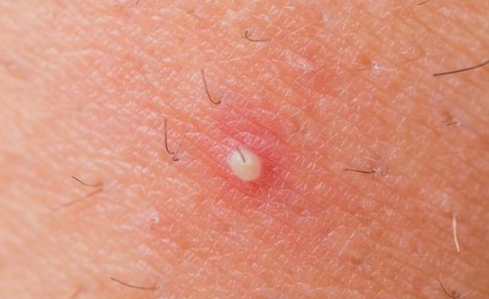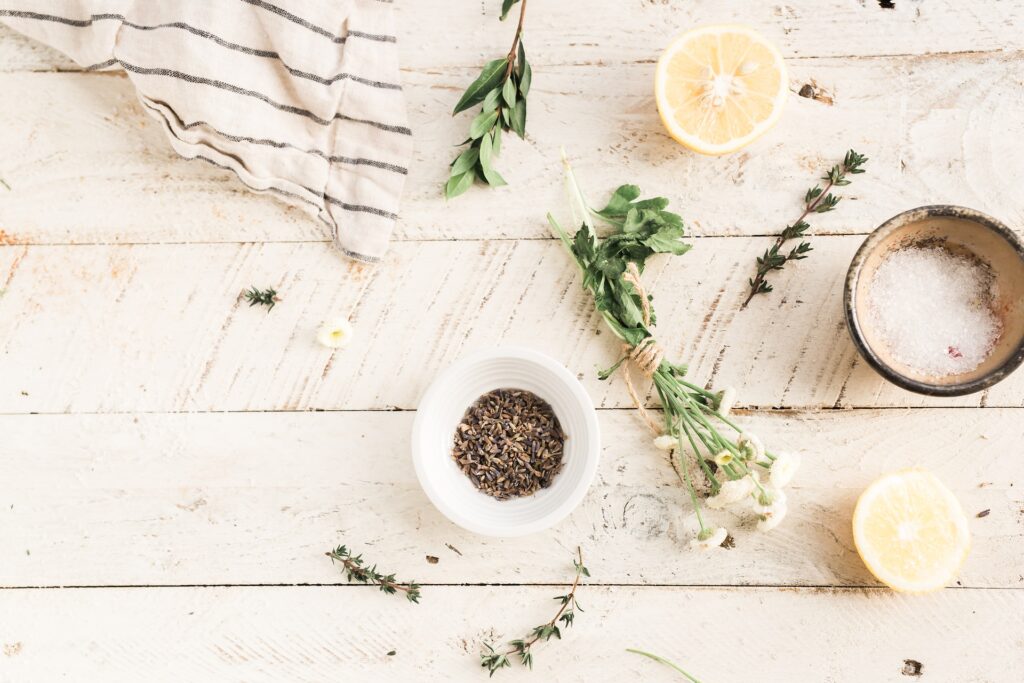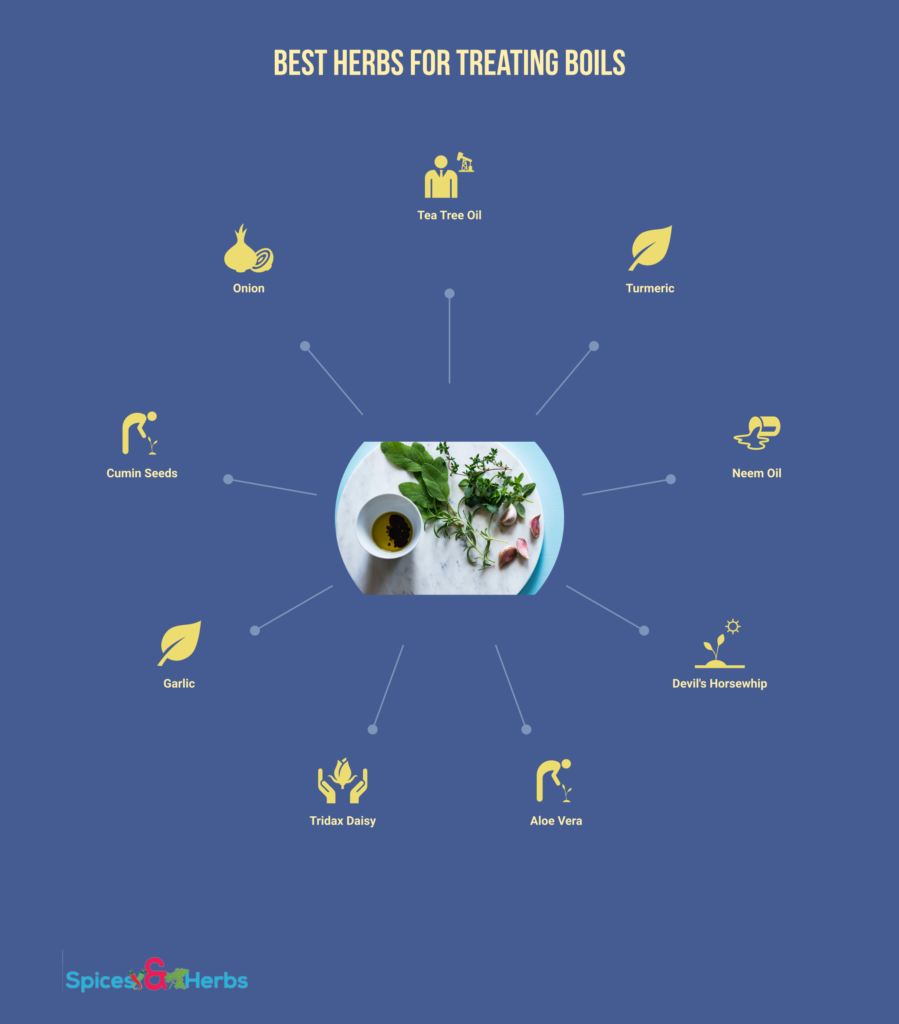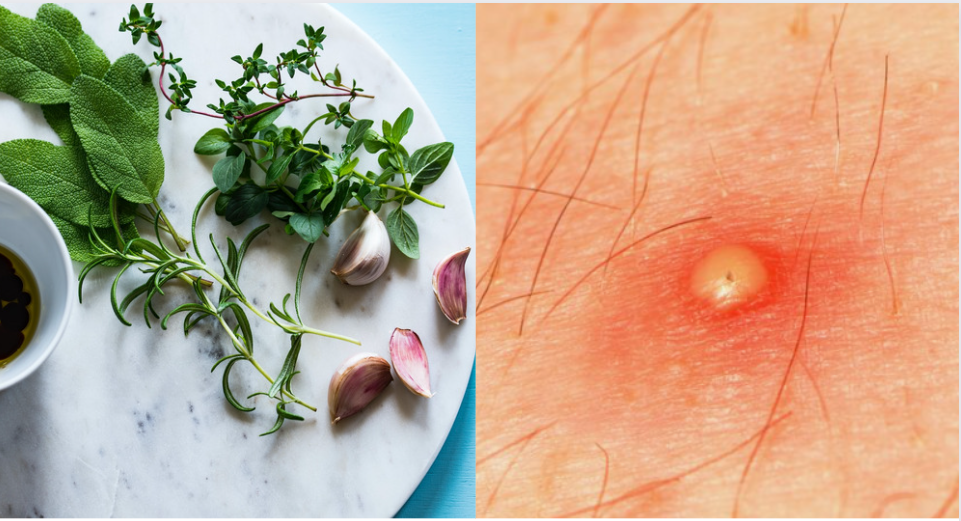Do you want to know what are the best herbs for treating boils? So you’re dealing with some pesky boils. Ugh, those are the worst! It’s hard to think of anything worse than an inflamed, painful boil on your skin; the redness and discomfort can drive you crazy. But don’t worry! There are many natural remedies out there that can help relieve your pain and speed up the healing process.
I have done my research since I’ve been struggling with boils, and I can confidently say that herbs are some of the best natural treatments. In this blog post, I will share my top picks for herbs for treating boils.
Understanding Boils and How They Form

Have you ever noticed a painful, red bump on your skin that seems to get bigger and more uncomfortable with each passing day? If so, you may be dealing with a boil.
Boils are essentially an infection of the hair follicle or oil gland on the skin. They often begin as a tender, red area that becomes firm and hard with time. Eventually, the center of the bump fills with white blood cells and bacteria, creating a pus-filled head. While they may occur anywhere on the skin, boils are most common on the face, neck, armpits, thighs, and buttocks.
Boils are typically caused by a type of bacteria called Staphylococcus aureus. This bacteria is commonly found on the skin or the nostrils, and most people are carriers to some degree. Boils usually occur when bacteria enter the skin through a small cut, injury, or hair follicle. People with weakened immune systems, poor personal hygiene, and certain medical conditions (like diabetes) are more susceptible to boils.
If left untreated, boils can become quite painful and large and may even cause fever and other systemic symptoms. In rare cases, they may spread to the bloodstream and cause more serious infections. For this reason, it is essential to take proper care of boils as soon as they appear.
Best Herbs for Treating Boils

So, herbs can be your best friend if you want to get rid of boils quickly and safely. Here are some of the most effective herbs for treating boils:
✔️Tea Tree Oil
Tea tree oil is extracted from the leaves of a tree called Melaleuca alternifolia, native to Australia. It has been used for its therapeutic properties for thousands of years. This oil contains terpenes-4-ol, alpha-terpineol, and cineole, which give it strong antiseptic, antibacterial, anti-inflammatory, and anti-fungal properties. These properties make it an excellent natural remedy for treating boils.
How to Use:
Mix 4-5 drops of tea tree oil with carrier oil like coconut or almond oil and apply it directly to the boil. Tea tree oil penetrates the skin and works to kill the bacteria that cause the boil. It also reduces inflammation and promotes healing. You can repeat this process twice a day until the boil is healed.
You can also use the oil in a warm compress. Boil some water and add a few drops of tea tree oil. Dip a clean cloth or cotton ball in the solution and apply it to the boil until the compress cools. Repeat this process twice a day for effective results. The warm compress helps to bring the boil to a head, allowing it to burst naturally, and tea tree oil aids in the healing process.
Another excellent way to use tea tree oil is in a bath. Add a few drops of tea tree oil to a warm bath and soak for 15-20 minutes. This method helps to clean and disinfect the boil and its surrounding area. It also helps to reduce the pain and discomfort associated with boils.
It is essential to note that tea tree oil is a powerful natural remedy and should be used with caution. Always dilute the oil with a carrier oil and do a patch test before applying it to your skin. Also, do not ingest tea tree oil, as it can be toxic when consumed orally.
✔️Turmeric
Turmeric oil is a potent essential oil extracted from the roots of turmeric, a spice that has been used for centuries for its healing properties. The oil contains essential compounds such as curcumin, turmerone, and zingiberene, giving it anti-inflammatory, antifungal, and antibacterial properties. Turmeric oil has a bright yellow color and a warm, spicy aroma.
How to Use :
In order to use turmeric oil for boils, you can mix it with a carrier oil such as coconut oil, jojoba oil, or sweet almond oil. Apply the mixture directly onto the boil and cover it with sterile gauze. You can repeat this process twice a day until the boil disappears. You can add a few drops of turmeric oil to your bathwater and soak in them for about 20 minutes. This will help cleanse your skin and prevent further infection.
Benefits of Turmeric Oil for Boils:
Turmeric oil has numerous benefits for boils. Here are some of the key benefits:
- Antibacterial properties help kill the bacteria that cause boils.
- Anti-inflammatory properties that help reduce the swelling and pain associated with boils.
- Promotes fast healing by increasing blood circulation to the affected area.
- It helps prevent scarring by reducing the risk of infection.
✔️Neem Oil
Neem oil is derived from the neem tree, a native tree of India. It has been used for centuries in Ayurvedic medicine to treat various ailments, including skin conditions. One of the reasons why it’s so effective for boils is because of its antibacterial properties. A bacterial infection often causes boils, and neem oil can help to kill off these bacteria and prevent the infection from spreading.
Another benefit of neem oil is its anti-inflammatory properties. Boils can be very painful and cause redness and swelling in the affected area. Neem oil can help to reduce this inflammation and provide relief from the pain. It also helps to soothe the skin and prevent itching; another common boils symptom.
How to Use :
So, how do you use neem oil for boils? There are a few different ways. One way is to apply it directly to the boil. Simply dab a small amount of neem oil onto the affected area and gently massage it. You can do this a few times a day until the boil begins to heal. Another way is to mix neem oil with a carrier oil, such as coconut or olive oil, and apply it to a boil. It can help to dilute the neem oil and make it easier to apply.
In addition to using neem oil topically, you can take it orally to help prevent and treat boils. Neem oil is available in capsule form, which you can take daily. This can help to boost your immune system and prevent the infection from spreading. However, speaking with your doctor before taking neem oil orally is essential, as it can interact with certain medications and have side effects.
✔️Devil’s Horsewhip
Devil’s Horsewhip, also known as Chromolaena odorata, is a plant that is native to many tropical countries across the world. It has been used for centuries to treat various ailments and is particularly effective in boils. The herb is rich in antioxidants and anti-inflammatory compounds, making it a potent natural remedy for skin infections.
What’s great about Devil’s Horsewhip is that it can be used in several ways for boil treatment. One way is to directly apply the crushed leaves as a poultice to the boil or boil area. You should wrap the poultice in muslin or another soft cloth and applied to the affected area for around 20-30 minutes a few times a day. The poultice allows the active compounds in the leaves to penetrate the boil, soothe inflammation, and help it to heal faster.
Another way of using Devil’s Horsewhip is by brewing it into tea. The tea is a natural blood purifier and will help detoxify the body.’ Boils result from toxins in the body, which become trapped in hair follicles. Therefore, drinking tea regularly could lead to a reduction in the occurrence of boils. The tea can also cleanse the boil area and the surrounding skin.
✔️Aloe Vera
Aloe Vera has been used for centuries to soothe and treat different skin conditions such as burns, rashes, and insect bites. Due to its immense healing power, Aloe Vera has become popular in the medical industry to treat boils. The plant contains anti-inflammatory and antibacterial properties that help to reduce inflammation and prevent infections, which are key factors in treating boils. Aloe Vera can work wonders if you have a boil that’s just starting or already developed.
How to Use:
You can apply its gel over the affected area. The gel is obtained by splitting the Aloe Vera leaf and extracting its content. Apply the gel directly on the boil several times daily, covering it with a bandage. Repeat the process until the boil drains completely, which usually takes several days. The aloe vera gel helps to soothe the skin, reduce the swelling and pain, and prevent the boil from spreading.
Another way Aloe Vera helps treat boils is by boosting the immune system. The plant boosts the immune system by increasing white blood cell production, which plays a significant role in fighting infections. Drinking Aloe Vera juice or taking supplements can also help to improve the immune system, making it easier for the body to fight off bacterial and other infections.
Apart from fighting infections, Aloe Vera also helps in the healing process of damaged tissues. The plant contains amino acids and enzymes that stimulate collagen production, the most abundant protein in the human body. Collagen is vital in wound healing, as it helps to form new tissues and improve cell regeneration. Applying Aloe Vera gel on the boil helps to speed up the healing process and minimize the chances of scarring.

✔️Tridax Daisy
It is a wildflower, commonly found in Asia and Africa, with medicinal properties used in traditional medicine practices. The plant has been used for ages to treat various ailments, including fever, asthma, skin infections, and boils. If you’re like me, you may wonder how a plant can cure something as painful as boils. Well, let me tell you from personal experience Tridax Daisy is a lifesaver.
When I first discovered Tridax Daisy, I had a painful boil on my leg. I tried various over-the-counter creams and ointments, but nothing worked. So, I decided to give Tridax Daisy a try. I gathered some fresh leaves, crushed them, and applied them to the affected area. Within a day, the size of the boil had reduced significantly, and the pain was slowly subsiding. I was amazed!
The secret to the effectiveness of Tridax Daisy lies in its anti-inflammatory and antibacterial properties. It contains tannins, alkaloids, and flavonoids that fight harmful bacteria and reduce inflammation in the affected area. It also promotes quick healing, which is essential in treating boils. Another great thing about Tridax Daisy is that it is easily accessible. You don’t have to go to a pharmacy to buy it. It’s grown naturally in the wild and can be easily found in fields and parks. You can also grow some in your garden at home. It is very low maintenance and requires little water or attention.
✔️Garlic
Garlic is a powerful natural antibiotic that is great for fighting against bacteria and preventing the spread of infections. Bacterial infections cause boils, and garlic contains allicin, which gives it antibacterial properties. By crushing a garlic clove and placing it on the affected area, the allicin is released from the clove and goes to work fighting the bacteria causing the boil. I have used this method, and the infection decreased significantly by applying crushed garlic to my boil twice a week.
In addition to its antibiotic properties, garlic is also anti-inflammatory, making it an excellent choice for reducing inflammation and pain caused by the boil.
How to Use:
When you apply crushed garlic to the affected area, it helps reduce swelling by increasing blood circulation. Garlic also contains antioxidants that help protect your skin cells and promote healthy tissue growth, essential for healing.
Garlic can also be taken orally as a supplement to help amplify its effects. These supplements are available in many forms, such as capsules, tablets, and even oils. When taken orally, garlic helps boost your immune system, which is essential for fighting infections and promoting overall health. Some people swear by taking garlic supplements to prevent the recurrence of boils.
Another way to treat boils is to create a garlic paste. Crush several garlic cloves and mix them with a few drops of water to create a paste. Apply the paste to the affected area and let it sit for about thirty minutes before washing it off. The garlic paste not only helps to reduce inflammation and pain, but it also helps to dry out the boil, which can help it to heal faster.
✔️Cumin Seeds
Cumin seeds are packed with anti-inflammatory, antibacterial, and antiseptic properties. These qualities make cumin seeds an excellent natural remedy for boils. The high concentration of cumin aldehyde – an organic compound in cumin – fights against bacteria that cause boils. The seeds are an excellent source of iron, vitamins C, A, and E, and other minerals that boost the immune system. Our body can fight against the bacteria by eating or using cumin seeds while reducing inflammation.
How to Use:
You can apply cumin oil extracted from the cumin seeds directly to the affected area. However, if you don’t have cumin oil, you can prepare a paste by grinding cumin seeds and mixing them with water or honey. Apply the resulting paste to the boil and leave it for a few minutes before washing it off.
Cumin tea is another way to boost the immune system and promote healing from boils. Simmer one tablespoon of cumin seeds in two cups of water for 10 minutes and then strain. You can add honey or lemon to taste, and then drink once or twice a day. Another way to decrease the likelihood of boils is by incorporating cumin seeds into your diet. Add cumin seeds to your soups, stews, salad dressings, and other dishes. It will help cleanse your blood and reduce the chances of developing boils.
✔️Onion
Onion has been used in traditional medicine for its anti-inflammatory, antiseptic, and antimicrobial properties. All these properties make it a perfect herb for treating boils. When applied topically, onion juice can help draw out the pus inside the boil, which can help it to heal faster. The sulfur content in the onion also helps prevent the infection’s spread.
In order to use onion for the treatment of boils, chop one onion and boil it in a cup of water until it softens. Strain the mixture and allow it to cool. Then, soak a clean cloth or ball of cotton in the mixture and apply it to the affected area. Leave it for 10-15 minutes and reapply every few hours. It will help hasten the healing process and relieve the pain and discomfort.
Another way to use onion for boils is to make a poultice. Mix finely chopped onion with salt and apply it directly to the boil. Cover the poultice with a bandage or sterile cloth to keep it in place. Onion’s natural antiseptic properties will help prevent infection and promote quick healing.
Besides being used for boils, onion juice can treat skin infections like wounds, cuts, and insect bites. Apply the juice to the affected area and leave it to dry. Doing this regularly can prevent further infections and promote healthy skin.
These are some of the herbs I have personally used for treating boils. They work amazingly well and are completely natural. So if you are dealing with a boil, don’t hesitate to try these natural remedies!
When to Seek Medical Advice
In some cases, boils can become large and painful. If this is the case, getting medical advice from a doctor is important.
1: The Boil Is Large
If the boil is getting larger and starting to cause much pain, it may be wise to seek medical attention. A large boil could indicate that it has become infected and could lead to complications such as cellulitis, which spreads to the skin and tissues beneath the skin.
2: High Fever
If the boil is accompanied by fever, it could indicate an infection that has spread to other body parts. It is a time when you should seek medical attention immediately. High fever, chills, and sweats are symptoms of this type of infection that should not be ignored.
3: Severe Pain
Boils can be painful, but if the pain is unbearable and makes it difficult to perform regular tasks such as walking or experiencing severe pain in multiple areas around your body, it is essential to seek medical attention. Such pain could indicate an underlying condition that requires urgent attention.
4: The Boil Does Not Heal
If the boil does not heal after a few days of treatment, or if it keeps coming back even after it appears to have healed, it may be wise to seek medical attention. Such boils can indicate immune system disorders requiring a doctor’s attention.
5:You Notice Multiple Boils
Suppose you have more than one boil on your body, or if they start to appear in clusters, you should seek medical attention. This could indicate a bacterial infection, which requires antibiotics. Ignoring multiple boils can lead to serious health problems that require urgent care.
Although natural remedies are great for treating boils, it is always important to seek medical advice if the boil persists or causes severe pain. A qualified doctor may be able to diagnose and treat the underlying condition causing the boil to prevent further complications.
Frequently Asked Questions
Q: Can herbs be used as a standalone treatment for boils?
A: Yes, herbs can be used as a standalone treatment for boils. Several herbs have antibacterial and anti-inflammatory properties that can help reduce the inflammation and infection associated with boils. The most commonly used herbs for treating boils include turmeric, garlic, tea tree oil, and aloe vera.
Q: Can I use a combination of herbs to treat boils?
A: Yes, using a combination of herbs can be even more effective than using herbs individually. When you combine different herbs, you can create a potent mixture that addresses multiple symptoms. For example, you could mix turmeric and garlic to create an anti-inflammatory and antimicrobial paste that can help reduce inflammation and fight off infection.
Q: How long does it typically take for herbal treatments to show results for boils?
A: The time it takes for herbal treatments to show results for boils can vary depending on the severity of the boil and the herbs used. In general, you should start to see some improvement within a few days of starting treatment. If the boil is severe or has been present for a long time, it may take longer to see results.
Q: Can herbs speed up the healing process of boils?
A: Yes, herbs can help speed up the healing process of boils. Herbs like aloe vera and tea tree oil have antibacterial and anti-inflammatory properties that can help reduce inflammation and infection, speeding up healing. Additionally, herbs like turmeric can help stimulate blood flow to the affected area, which can help accelerate the healing process.
Q: Can herbs be used to prevent the recurrence of boils?
A: Yes, herbs can be used to prevent the recurrence of boils. Herbs like neem and Echinacea have immune-boosting properties that can help strengthen the body’s defenses against infection. Additionally, herbs like turmeric and cinnamon can help regulate blood sugar levels, preventing diabetes, which can increase the risk of developing boils.
Final Words
I have to say that herbs for treating boils are a complete game-changer! The natural benefits that herbs can offer to your body are unmatched. I cannot stress enough the importance of nature and how it has so much to offer in terms of treating various ailments. The effectiveness of these herbs is simply astounding, and you will be left in awe once you see the results for yourself. It’s amazing how one simple change in your life, such as incorporating herbs into your daily routine, can make all the difference. So if you’re struggling with boils, give herbs a try.

